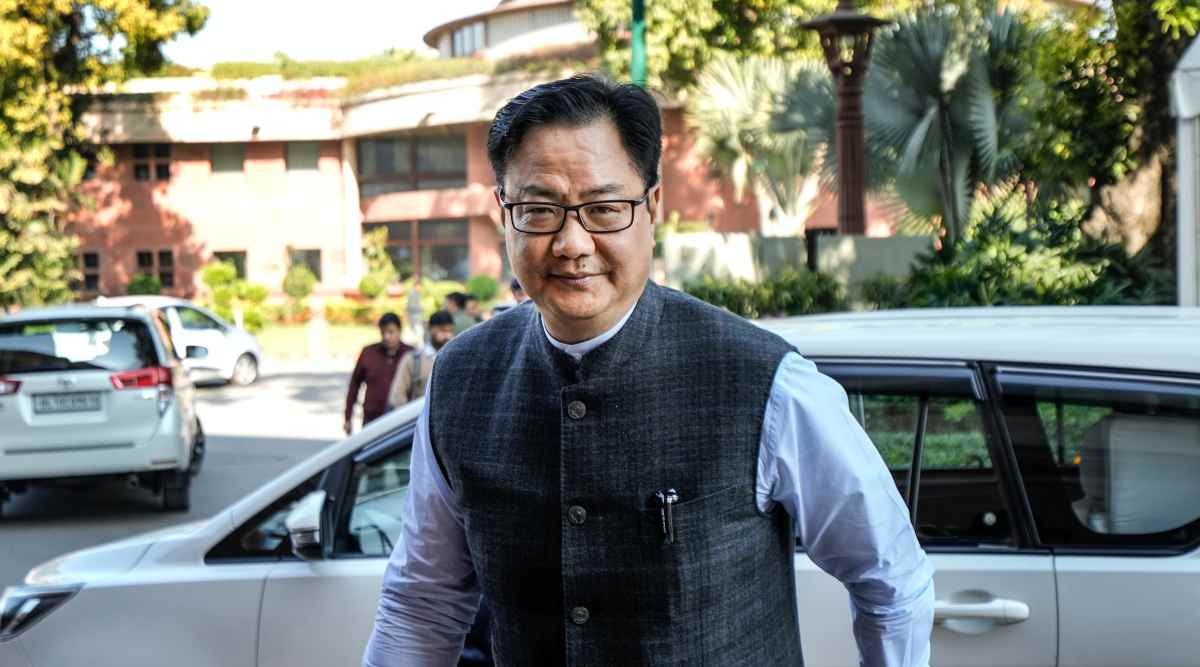Kiren Rijiju no longer law minister: A look at his political career, controversies
Before Rijiju got the charge of the law ministry, he has served as the minister of state (MoS) (independent charge) youth affairs and sport, MoS minority affairs, and MoS home affairs.
 Kiren Rjiju has been shifted from the law ministry and assigned Ministry of Earth Sciences. (PTI Photo/File)
Kiren Rjiju has been shifted from the law ministry and assigned Ministry of Earth Sciences. (PTI Photo/File)After protracted tensions between Union Law Minister Kiren Rijiju and the judiciary, the BJP leader was Thursday removed from the post and handed the portfolio of the earth sciences ministry.
According to a press communication by the Rashtrapati Bhavan, Arun Ram Meghwal, currently the minister of state for parliamentary affairs and culture, will take over the key law and justice ministry.
With his brusque and gutsy style, Rijiju, during his tenure as the law minister, took on the judiciary on several issues from the appointment of judges and accountability to court vacations.
Here’s a look at his political career and controversies in six points.
- 01
Rijiju's political career and education
Rijiju, 51, is a three-time Lok Sabha MP from Arunachal Pradesh. He had taken over as the Union law minister in July 2021.
Before Rijiju got the charge of the law ministry, he has served as the minister of state (MoS) (independent charge) youth affairs and sports, MoS minority affairs, and MoS home affairs.
The BJP leader had completed his bachelor's degree at Hansraj College and then studied law at the Faculty of Law, Delhi University.
- 02
Kiren Rijiju had called the collegium system 'opaque'
In 2022, Kiren Rijiju had called the collegium system, where sitting judges appoint new judges to constitutional courts, "opaque" and "alien to our Constitution".
“I am not critical about the judiciary or the judges, but I state a fact which is the reflection of the thinking of the common people of India… The Collegium system is opaque and is not accountable. Judges and lawyers too believe this,” he had said last November.
He had further implied that the appointments were made based on personal associations, asserting that "the fittest" should be appointed and not those known to the collegium.
- 03
Rijiju pushed for government role in appointment of judges
“Across the globe, judges do not appoint judges. But in India, they do so. Judges have to devote a lot of time to the entire process of recommending names. A lot of politics is involved in the process,” Rijiju had stated last year, pushing for the government's involvement in the appointment of judges.
In January this year, the minister had written to Chief Justice of India DY Chandrachud suggesting the inclusion of a government nominee in the decision-making process for shortlisting of judges. In his letter, Rijiju opined that doing so will "infuse transparency and public accountability".
- 04
Appeal in SC against Rijiju over his comments
Rijiju's remarks against the collegium and the judicial system were met with widespread backlash from the legal community. The Bombay Lawyers Association (BLA) had claimed that Rijiju had shown lack of faith in the Constitution with his remarks, and had filed an appeal in the apex court against the politician.
Following this, Rijiju had described the collegium issue as a "mindgame" in April 2023, and had refused to speak about it at a public event.
- 05
His reprimand over the appointments issue
The Union minister had criticised the Supreme Court's revelation of the government's objections over the appointment of three judges in January, calling it a matter of “grave concern”.
This came after the top court had made public the the government’s exceptions to the three names recommended for appointments by the court, as well as the reasons for clearing the names despite the executive’s opposition. - 06
The Nehru controversy
The former law minister had stirred another row in 2022 by accusing India’s first Prime Minister Jawaharlal Nehru of committing “five blunders". In an article for News18, Rijiju had blamed Nehru for the Kashmir problem and stated that the prime minister had let the “myth” of a UN-mandated plebiscite perpetuate and created the “divisive” Article 370 of the Constitution.
The Congress had condemned Rijiju's editorial, accusing him of peddling lies.







